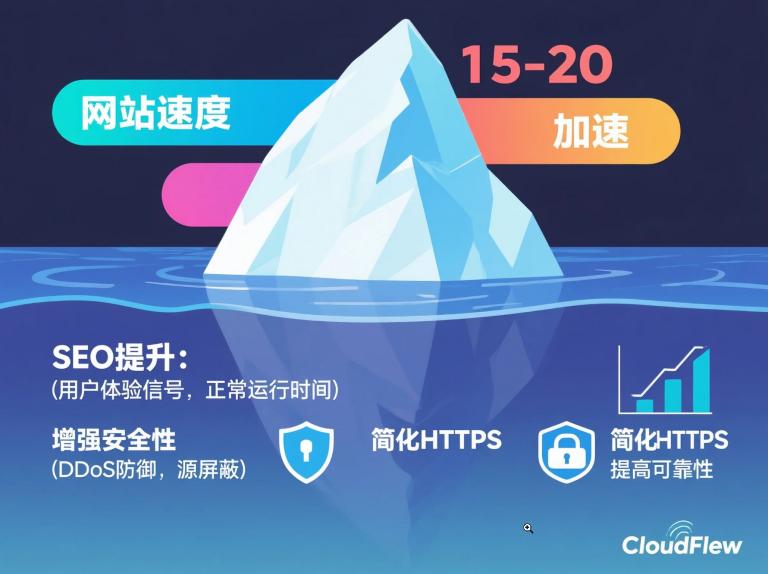
Okay, let's talk CDNs. When you hear "Content Delivery Network," what's the first thing that pops into your head? Speed, right? Lightning-fast load times, making your website feel like it's powered by rocket fuel. And yeah, that's absolutely a huge part of the magic. It's CDN 101.
But what if I told you that incredible speed is just the flashy headline? What if the real power, the stuff that quietly works behind the scenes to boost your search rankings and lock down your website's security, lies beyond just pure velocity?
It's true! While everyone's chasing faster load times (and you absolutely should be!), focusing only on speed means you might be missing out on some of the most compelling reasons to embrace CDN technology. Ready to uncover the secret superpowers of CDNs that often fly under the radar? Let's peel back the layers and explore the significant, often-overlooked SEO and Security benefits that a service like
SEO Perk #1: Becoming Google's Favorite Guest (Thanks to Stellar UX Signals)
Alright, we know speed impacts User Experience (UX), and Google loves good UX. But let's dig deeper than just "fast = good." Think about the signals Google actually measures to understand if users are having a good time on your site after they click that search result. We're talking about things like:
Bounce Rate: Did the user take one look and immediately leave? (High bounce rate = bad signal)
Time on Site: Did they stick around, explore, read your stuff? (Longer time = good signal)
Pages per Session: Did they just view one page, or did they dive deeper? (More pages = good signal)
Now, how does a CDN influence these crucial metrics? By making your site load incredibly fast, especially for users far from your server, a CDN directly combats that initial frustration that leads to immediate bounces. Imagine walking into a store – if it's bright, clean, and easy to navigate instantly, you're likely to browse. If it's dark, cluttered, and takes ages for someone to greet you, you're out the door. Your website is no different!
A fast, smooth experience, powered by a CDN, encourages users to stay longer, click on more links, and generally engage more deeply with your content. This positive engagement sends powerful signals back to Google, essentially saying, "Hey, people like this place! It's valuable and relevant." While not a direct ranking factor itself, this improved user engagement based on a CDN-enhanced experience is a massive indirect boost to your SEO efforts over time. It helps Google see your site as a quality destination worth ranking higher.
SEO Perk #2: The Always-On Advantage (Reliability as a Ranking Factor)
Picture this: Your website is your business's digital storefront. What happens if that storefront randomly closes during peak hours because too many people showed up (a traffic spike) or due to some server hiccup? Disaster, right? Reliability and uptime are critical not just for sales, but also for SEO.
Search engines like Google view frequent downtime or server errors (those lovely 5xx errors) as signs of a low-quality, unreliable website. If Googlebot tries to crawl your site and repeatedly hits errors or timeouts, it might crawl your site less frequently (impacting how quickly your new content gets indexed) and will definitely factor that instability into its assessment of your site's overall health.
This is where a CDN acts like your website's unsung hero of stability.
Load Balancing: It distributes incoming traffic across its vast network of edge servers, preventing your single origin server from getting overwhelmed during busy periods (like, say, right before Golden Week here in Japan!).
Caching Power: Because the CDN serves cached static content from its edge servers, many user requests never even need to reach your origin server. This drastically reduces server load and means that even if your origin server has a temporary wobble, the CDN can often keep serving the cached version of your site, maintaining availability. Think of it as your website having multiple backup power generators and dozens of entrances – it just keeps running smoothly.
Reliable infrastructure providers like
SEO Perk #3: A Helping Hand with HTTPS & Core Web Vitals
We all know HTTPS (the secure version of HTTP) is mandatory these days. Google uses it as a ranking signal, browsers flag non-HTTPS sites as "Not Secure," and users simply expect it for trust. Getting that padlock icon is essential.
How does a CDN help here, beyond just delivering things fast?
Simplified SSL Management: Implementing and managing SSL/TLS certificates can sometimes be fiddly. Many CDNs streamline this. Services associated with providers like
CloudFlew SSL might offer one-click provisioning of free SSL certificates (like Let's Encrypt) or make it super easy to upload and manage your own commercial certificates across their entire network.Faster Secure Handshakes: The CDN handles the initial secure TLS handshake with the user at the edge server, which is closer to them. This can reduce the latency involved in establishing that secure connection, contributing to faster perceived load times.
Boosting Core Web Vitals (Subtly): We know CDN crushes LCP (Largest Contentful Paint) because it delivers big files fast. But its reliable, fast delivery of all assets (CSS, JS, fonts) from stable edge servers can also contribute positively to CLS (Cumulative Layout Shift) by helping elements load predictably and preventing jarring layout jumps while the page renders. A solid overall Core Web Vitals score is a known factor in Google's ranking algorithm.
So, a CDN helps you secure your site more easily (direct SEO & trust signal) and contributes positively across multiple Core Web Vitals (indirect & direct SEO signals). Pretty neat, huh?
Security Boost #1: Your Website's Personal Bodyguard (DDoS Mitigation)
Okay, let's switch gears fully to security. One of the most common and disruptive threats online is the Distributed Denial of Service (DDoS) attack. The goal? Flood your server with so much junk traffic that it gets overwhelmed and legitimate users can't connect – effectively taking your website offline.
Think of a CDN as a massive, globally distributed shield. Its network is designed to handle enormous amounts of traffic, far more than your origin server likely can. When a DDoS attack hits, instead of overwhelming your single server, the malicious traffic gets dispersed across hundreds or thousands of powerful CDN edge servers around the world. It's like trying to flood an entire ocean with a garden hose – the sheer scale absorbs the impact.
Furthermore, robust CDN solutions, including those provided by companies like
Security Boost #2: Hiding the Keys & Adding More Locks (Origin Cloaking & WAF)
Here's another security perk that's often overlooked: origin protection. When users connect to your site through a CDN, their connection terminates at the CDN edge server. The CDN then fetches content from your origin server, but the user (and potentially attackers) often doesn't see your origin server's direct IP address. This "cloaking" makes it much harder for malicious actors to target your primary server directly with attacks other than those hitting the public-facing website domain. It’s like keeping the location of your main vault a secret while forcing everyone through heavily guarded checkpoints first.
Additionally, many CDN providers offer an integrated Web Application Firewall (WAF) as an add-on or built-in feature. A WAF operates at the application layer, inspecting incoming HTTP requests for common attack patterns like SQL injection, cross-site scripting (XSS), and other vulnerabilities before they reach your actual website code. This is like having extra security guards at the gate who not only check IDs but also screen visitors for known threats. While not all CDNs include a WAF by default, it's a powerful synergistic benefit available with many platforms, including potentially from
Conclusion: Look Beyond the Speedometer!
So, you see? Thinking of a CDN as just a speed booster is like thinking of a smartphone as just a device for making calls. The speed is fantastic, it's the headline feature, but the real, game-changing value often lies in the less-obvious benefits.
A well-implemented CDN:
Sends positive User Experience signals to Google, indirectly boosting SEO.
Enhances website reliability and uptime, crucial for technical SEO health.
Simplifies HTTPS deployment and contributes to better Core Web Vitals scores.
Acts as a powerful shield against debilitating DDoS attacks.
Can help cloak your origin server and potentially filter application-layer attacks via WAF.
When you invest in a quality CDN service, perhaps from

